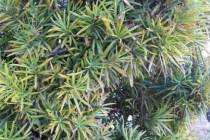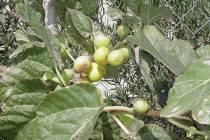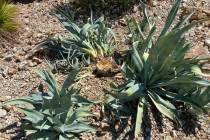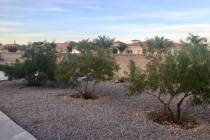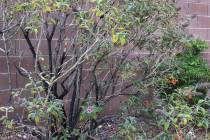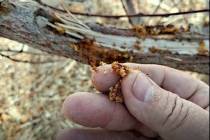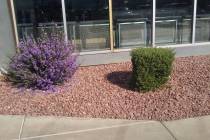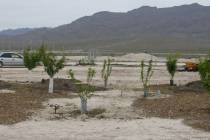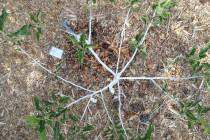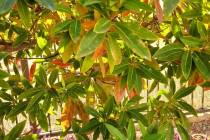As we water plants infrequently, the roots extract water and grow into deeper layers of soil. Deep rooting of plants is the main reason good gardeners say, “Water plants deeply but infrequently.”
- Home
- >> Local
- >> Local Columns
Bob Morris
Bob Morris is a horticulture expert living in Las Vegas and professor emeritus for the University of Nevada. Visit his blog at xtremehorticulture.blogspot.com. Send questions to Extremehort@aol.com.
Privacy shrubs should be tall enough to create the privacy needed but not much taller. Bigger shrubs need more water than smaller shrubs, and they need more maintenance as they get older.
California pepper tree is evergreen. Evergreen plants constantly drop leaves all season long but drop their leaves heaviest soon after times of new growth.
To prevent fruit production in an ornamental tree, spray the it with a chemical every year to get the fruit to drop when it’s still small. Spray the entire canopy of the tree when as many of the flowers are open as possible.
Bright, cloudless skies and strong winds equals high water use in our desert climate. It’s time to water during bright windy weather.
Podocarpus or yew pine doesn’t like soil covered in rock. It is not a desert plant.
There is a difference in taste among figs. Much of it is what you prefer.
There is some bad information on the internet saying that pygmy date palm can handle temperatures to 22 degrees. That’s not true. It’s more like about 28 degrees.
Grapevines do best in our desert when planted like fruit trees — planted in amended soil and the soil covered in woodchips.
When making a spot that attracts butterflies, choose a warm location out of the wind. Choose flowers in yellow, orange, red and pinks that bloom in spring or fall when it is cooler, and plant them in large numbers.
Right after a rain is a good time to look for borers feeding in the moist cambium of fruit trees. It’s a good time to get out a sharp knife, sanitize and sharpen it, and remove these borers before they cause more damage.
Gardeners can remove small amounts from trees and shrubs any time during the year, but this is the time of year when you can take large amounts of wood from trees, shrubs and plants.
Wood chip mulch is again available at the University of Nevada Cooperative Extension orchard located 100 yards east of Horse Drive and North Decatur Boulevard.
The temperature of compost when it’s cooling is only about 105 degrees. The center of the pile might be hotter, but it’s not hot enough to damage plants.
Phone apps are good for predicting a possible freeze, but nothing replaces verification that an actual freeze happened. Maximum/minimum thermometers are a good bench check against your phone app or the National Weather Service predictions.








